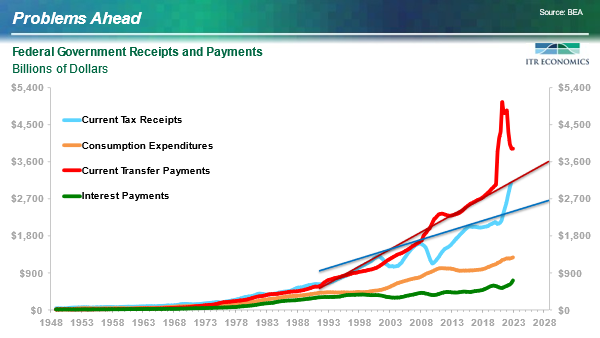On Track for a Depression
The updated analysis confirms that the global economy is on track for a prolonged decline in the early 2030s that will constitute an economic Depression. The following long-term trends continue to lead us to the 2030s and will position the economy for what we estimate will be six years of general decline:
- Demographics
- Health Care Costs
- Entitlements
- Inflation
- National Debt
As a follow-up to our July 27, 2023, webinar on the 2030s (conducted by Alan and me), we are answering the questions that arose in the aftermath in a series of blogs. ITR Economics maintains that the best that we all can do is be forewarned and therefore forearmed. Recognizing that smart people think of different perspectives and angles and have questions, we answer three more questions below pertaining to:
- Real Estate
- Federal Deficit Spending
- Canada
Real Estate
The question: “What is your stance on residential and multi-family investments over the next 10 years?”
The short answer is favorable assuming that the demographics are solidly positive in terms of growth, education, age, and wealth/poverty and that the property is in the right location and caters to workers/professionals that are likely to be relatively unscathed by the 2030s downturn.
We caution people about being highly leveraged going into the 2030s, and that is certainly the case for single-family and multi-family investments. You should assume a higher risk of vacancy and stress-test your cash flow vigorously.
Also, the question is being answered with a literal 10-year horizon. We noted during the July 2023 webinar that there will be a period of deflation in the tailing years of the downturn. This means that a longer-term hold period may mean a deflation in your net worth as the investment properties have less market value. In that case, you need to determine when/if you have to (or might have to) liquidate the real estate investments.
Federal Deficit Spending
The question: “On the chart that showed Current Transfer Payments and Current Tax Receipts, it seems to indicate that our Transfer Payments (assuming these are entitlements) already exceed Tax Receipts?”
The answer: You are correct! Transfer Payments, which include entitlement programs, have been running above Tax Receipts since 2008. This is fundamental to our assessment that the national debt will continue to grow as a percent of GDP as we head into the 2030s debacle. Add in the inevitable increase in Interest Payments on the debt (our opinion), and you have an untenable situation regarding the financial health of our economy.

Canada
The question: “For your Canadian viewers, do you see any significant differences from your numbers today? Where worse, and where better?”
There are no significant changes as defined by what we put forth in our book, Prosperity in the Age of Decline. Canada remains one of our safe-haven investment choices during most of the 2030s. We say “most” because there should be a shift toward equities as North America recovers in the latter years of the 2030s.
We intend to be invested in Canadian Government Bonds. What we continue to like about Canada is the fact that the nation’s debt is running well below 70% of GDP and therefore well below an important tipping point. The term to maturity we will invest in will depend on the shape of the yield curve as we approach the decision point. There are also other countries on our short list of preferred places to invest our money, but proximity and familiarity make Canada a perennial favorite.
Alas, not all is as solid as it used to be at the time of writing Prosperity in the Age of Decline. There is a trend in Canada toward per capita debt taking on US-like proportions. Delinquency rates are currently rising more noticeably than in the US. Real estate inflation has also been very real in Canada and could prove to be problematic in the 2030s. We will continue to closely watch these trends to determine if we need to reassess our position.
What to Do
Number 6 on our Top 10 Rules for Managing the Business Cycle is equally applicable to the 2030s. Develop a culture of beating the cycle rather than accepting the cycle.
There is ample time to determine how you can be involved in markets and employment sectors that are not as prone to succumbing to the cycle of the 2030s as the average market/industry. Being laser focused on that quest starting now can make all the difference in the world for your family, your business, your team, and the greater community.


